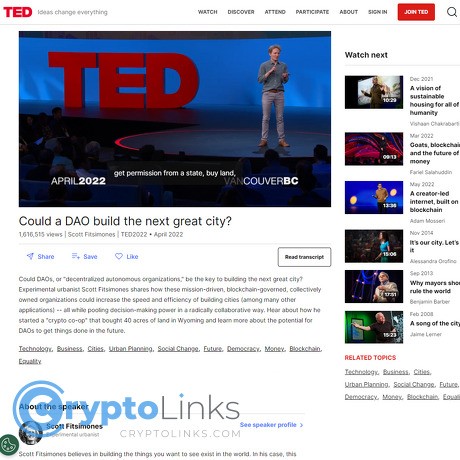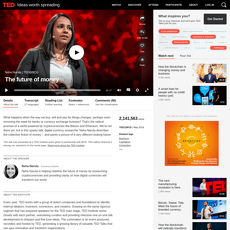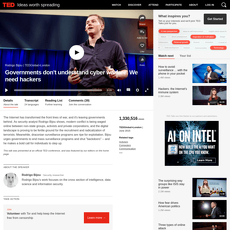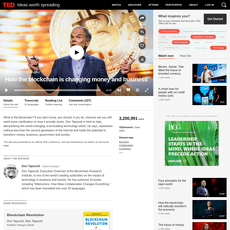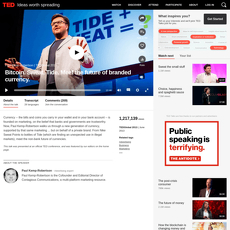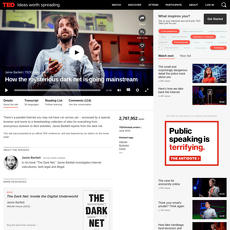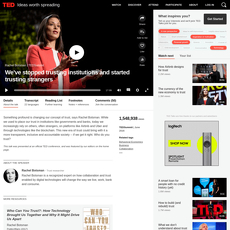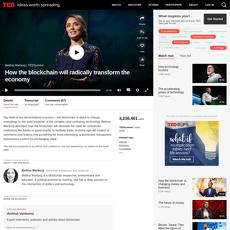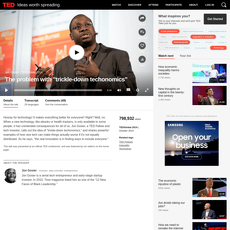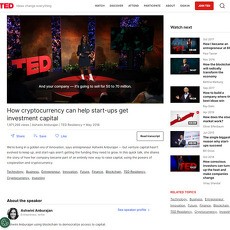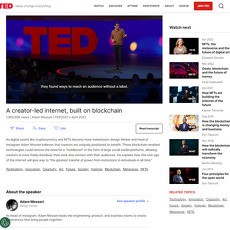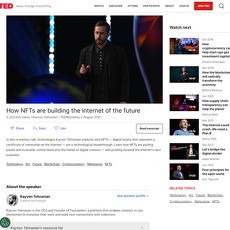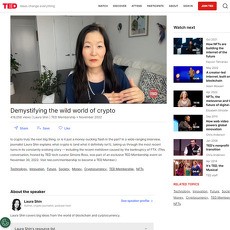Scott Fitsimones: Could a DAO build the next great city? Review
Scott Fitsimones: Could a DAO build the next great city?
www.ted.com
Could a DAO Really Build the Next Great City? My Take on Scott Fitsimones’ TED Talk (With FAQ)
Would you actually move to a city built by the internet—where land, services, and local rules are coordinated by a DAO? Sounds wild. But after watching Scott Fitsimones’ TED Talk and reading through the transcript, I think this question is getting real enough that it deserves a clear, practical look.
I’m going to keep this simple: what’s realistic right now, what’s fantasy, and how to approach the idea without getting wrecked by legal traps, governance chaos, or flashy token promises. If you’re curious about CityDAO, what Parcel 0 actually was, and how a city DAO might function beyond tweets and TED stages, you’re in the right place.
The real problem: internet coordination meets dirt, deeds, and daily life
Most people get the crypto part—tokens, wallets, DAOs. The confusion starts when you try to connect that to real-world city stuff. Here are the sticking points I keep hearing:
- Land and law: Can a DAO actually hold a deed, pull permits, and work within zoning rules?
- Governance without chaos: How do you avoid a “crypto HOA from hell” or rule-by-whales?
- Services and accountability: Who handles maintenance, utilities, and public safety—and how do you keep it transparent?
- Funding: What’s legal, what’s sustainable, and how do you avoid turning the token into an accidental security?
- Identity and fairness: One person, one vote… in a world of wallets and pseudonyms?
- Trust: How do you separate serious experiments from internet land grabs and vaporware?
If you’ve felt any of that, good—you’re asking the right questions. The promise here isn’t “crypto fixes cities.” It’s that the internet gives us new coordination tools, and a few teams are starting to test them on real ground.
What I’m promising you
This isn’t a hype piece. I’ll translate the TED Talk into plain English, compare it with actual experiments (yes, including CityDAO), sketch the legal and tech realities, map a cautious roadmap from idea to pilot, and answer the questions people are already Googling—like legality, costs, and who’s doing this well.
Expect no-BS takes, real examples, and links you can check yourself. I’ll point out what works right now, what’s still research-y, and what to avoid.
Who this guide is for
- Crypto-curious: You’ve heard “DAO cities” and want to know if it’s legit or meme-level.
- DAO builders: You’re thinking about legal wrappers, governance, and a roadmap that won’t implode.
- City nerds and urbanists: You care about housing, zoning, and better local governance.
- Policymakers and operators: You want new investment and civic models without chaos.
Quick context: Scott Fitsimones and CityDAO
Scott Fitsimones is an entrepreneur who helped kickstart CityDAO in 2021—one of the first high-profile attempts to connect a DAO to real land. He later gave a TED Talk asking a bold question: could the internet build a better city?
Here’s the nutshell story you should know:
- Legal first: CityDAO formed under Wyoming’s DAO LLC statute (SF0038, 2021), which allows DAOs to exist as limited liability companies. That’s a big deal because it creates a bridge between smart contracts and state law.
- Real land: The project acquired a 40-acre property in Wyoming known as Parcel 0. It’s not a full-blown city; it’s a testbed to learn how a DAO could coordinate around land, rules, and access. You can dig into the public docs here: docs.citydao.io.
- Governance experiments: CityDAO ran early votes, set up working groups, and experimented with membership NFTs and shared rules—publicly, on-chain, with a treasury you can audit. Not perfect, but a real attempt.
- Why now: Post-2021, we’ve seen more mature tooling (multi-sigs, quadratic funding, KYC’d memberships), better legal wrappers (Wyoming, Marshall Islands), and a wider recognition that “token = city” is not the move. Think cooperative, not casino.
None of this means “problem solved.” Zoning can derail you faster than any smart contract bug. Securities law can turn your token into a legal headache. Identity is hard. But there’s signal here, not just noise.
“The internet is the greatest coordination machine we’ve ever built.” That part is true. The question is whether we can turn that coordination into fair, livable, legally sound communities—without recreating the same old power problems in a shinier UI.
If you like reading beyond TED, it’s also worth remembering that community governance isn’t a brand-new concept. Elinor Ostrom won a Nobel for her work on successful community rule-making for shared resources—ideas that map nicely to DAO governance basics like clear rules, monitoring, and graduated sanctions. If you want a primer, start here: Elinor Ostrom. And for modern funding mechanics, check out quadratic funding experiments by Gitcoin.
So, could a DAO really build the next great city? Let’s not answer that with slogans. Let’s start with what Scott actually argues—and what he skips. Ready for the simple version of the TED Talk that cuts through the buzzwords?
What Scott Fitsimones Actually Argues in His TED Talk
Here’s the core message I heard: the internet isn’t just for memes and markets anymore—it can coordinate people and money to build places in the real world, starting with land and growing into fully functioning neighborhoods. The tool to do it? A DAO that lets residents set the rules, own the upside, and adapt faster than legacy city hall.
“Cities have the capability of providing something for everybody, only because, and only when, they are created by everybody.” — Jane Jacobs
The big idea in one line
Use DAOs to form internet-native, community-owned entities that buy land, run transparent budgets, and govern locally with programmable rules—so a city can respond in weeks, not years.
Why a DAO for a city?
Scott’s pitch is simple: DAOs turn residents into stakeholders and give them real levers. That’s not a vibe shift; it’s a power shift.
- Transparent treasuries: On-chain budgets mean anyone can see how funds move. Platforms like DeepDAO already track tens of billions in DAO treasuries across the space.
- Programmable rules: Smart contracts encode membership, proposals, quorums, and spending. No “mystery meetings”; governance is auditable.
- Resident ownership: People don’t just pay taxes—they hold membership and share in the upside of better decisions (lower costs, better services).
- Faster coordination: Online proposals can move from idea to vote in days. Think of how Tally or Snapshot decisions show timestamps, voters, and outcomes—no backroom loops.
- Portability: Rules and records live on-chain, so expanding from one parcel to multiple sites doesn’t mean rebuilding the entire governance stack each time.
Real examples he points to (CityDAO and friends)
This isn’t coming out of thin air—there are already test cases that hint at what’s possible (and what’s painful).
- CityDAO (Wyoming): The project formed a Wyoming DAO LLC and bought a chunk of land known as Parcel 0 near Cody, Wyoming. It ran early governance experiments, member votes, and public documentation on entity structure and land stewardship. Check their materials: docs.citydao.io.
- Cabin: A networked neighborhood approach—properties, “passports,” and community governance tying together multiple locations. It’s not a city, but it’s a living lab for residency, work, and shared standards: cabin.city.
- Zuzalu: A pop-up community that ran for two months with health tech and governance experiments, showcasing how internet-native groups can coordinate real services fast: vitalik.ca on Zuzalu.
- Próspera (Honduras): Not a DAO, but a charter-jurisdiction play that shows how alternative governance zones can attract builders—while also revealing the political risk when frameworks shift: prospera.co and context on legal changes via Reuters.
- ConstitutionDAO: Again, not a city—but a clear proof that internet groups can mobilize lightning-fast: it raised ~$47M in days to bid on a U.S. Constitution copy (CNBC). The coordination muscle is real.
What the talk glosses over
There’s electricity here—but also voltage. A few hefty realities don’t fit neatly into a TED clock.
- Zoning and entitlements take time: Even with community support, land use approvals are slow. For example, New York’s ULURP has a formal 7-month clock after a long pre-certification process (NYC DCP).
- Securities law is not optional: If you issue tokens with profit expectations, you’re likely in securities territory. The SEC’s 2017 DAO Report sets the baseline (SEC).
- Identity and Sybil resistance: One-person-one-vote requires robust human verification. Options exist—Gitcoin Passport, BrightID, Proof of Humanity—but they’re not foolproof and introduce privacy trade-offs.
- Capital-heavy services: Roads, water, wastewater, power, and broadband are expensive, regulated, and slow to change. Many cities underestimate the long-tail maintenance burden (Strong Towns).
- Avoiding plutocracy: Token voting can tilt toward whales. Research like Liberal Radicalism and work on soulbound credentials proposes fixes (quadratic voting, reputation, citizenship credentials), but these add complexity and need careful testing.
The energy behind the movement
Why is this idea getting real traction now? Because the ingredients finally exist:
- Remote-first life is normal: Work-from-home is sticky—about a quarter to a third of workdays in the U.S. are still remote, according to WFH Research. People can choose communities that fit values, not commutes.
- On-chain treasuries are ready: DAOs collectively manage massive budgets (see DeepDAO), and stablecoins settle trillions annually on public rails (Visa Crypto research).
- New legal wrappers exist: Structures like the Wyoming DAO LLC made it straightforward to link smart contracts to land and contracts in the real world—today, not someday.
- Global coordination is instantaneous: We’ve seen the internet summon serious capital and talent in days. That speed, paired with transparent rules, is the spark for city-scale experiments.
I can feel the pull: imagine seeing a budget, voting on a local service, and watching it get funded hours later. But the question is what’s actually possible right now. So—what exactly is a DAO in normal words, and how does it touch land without breaking the rules? Let’s make that painfully simple next.
DAO 101 for City-Building: Clear, Practical Basics
What is a DAO, in normal words?
A DAO is just a group of people coordinating money and rules online, with software doing the bookkeeping. Think of it like a transparent group chat with a shared bank account—where votes trigger actions, budgets are tracked in real time, and commitments are written as code so they’re hard to fudge later.
That software lives on a blockchain (smart contracts), but the group still needs a legal shell to act in the real world—sign leases, buy land, hire contractors. That’s where “wrappers” come in. The DAO votes; an entity executes.
“Cities have the capability of providing something for everybody, only because, and only when, they are created by everybody.”
— Jane Jacobs
I carry that line in my head any time someone asks whether DAOs are just gimmicks. The point isn’t the tech—it’s giving people a real seat at the table and receipts for how the money moves.
Can a DAO own land?
Short answer: yes, through the right entity. A smart contract can’t hold a deed, but an entity controlled by the DAO can. There are a few battle-tested paths:
- Wyoming DAO LLC: Recognizes DAOs as LLCs (since 2021). State guidance spells out how on-chain governance can manage an off-chain company. CityDAO used a Wyoming DAO LLC to hold Parcel 0—the deed sits with the LLC; DAO votes direct the signers.
- Marshall Islands DAO LLC: Purpose-built for DAOs with lighter global friction. The RMI framework lets token holders govern while the LLC signs contracts.
- Foundations/Trusts: Swiss foundations, Cayman foundations, or US/Delaware entities can hold land or subsidiaries. Common for protocol treasuries; workable for real estate with the right operating agreements.
Operationally, you’ll appoint an agent (or a management company) to execute the DAO’s decisions: bidding on parcels, securing permits, paying vendors. Paper reflects code, not the other way around.
Governance: one-token-one-vote vs one-person-one-vote
City building is where “fairness math” matters. One-token-one-vote is simple—but it can concentrate power in whales and speculators. Cities need legitimacy, not just capital. Here’s what’s working in practice:
- Citizenship NFTs (one person, one vote): Gate voting to verified residents/citizens. Use privacy-preserving checks like Gitcoin Passport, BrightID, or residency attestations. Optimism’s Citizens’ House shows how non-transferrable “citizenship” can curb plutocracy.
- Quadratic voting/funding: Weighs intensity of preference so many small voices can beat a few big ones. Colorado’s statehouse tested QV in 2019 to prioritize legislation, finding it surfaced cross-party priorities better than simple votes. Gitcoin has routed tens of millions via quadratic funding with strong sybil defenses.
- Bicameral or council models: Split power:
- Residents’ House (1 person = 1 vote) for local rules, service standards, and land use.
- Treasury/Capital House (stake or delegated voting) for budgets, partnerships, and long-horizon bets.
- Time-weighted and conviction voting: Reward long-term skin-in-the-game and steady support. Projects like 1Hive and Commons Stack tested conviction voting to reduce knee-jerk swings.
- Caps and conflicts: Hard caps on voting power per person, transparent conflict-of-interest rules, and public delegate statements reduce capture.
Bottom line: if you want families to move in and businesses to plan ahead, governance must feel human, not financialized.
Funding a city DAO
There’s no single “right” mix. The goal is to fund real services without painting a regulatory target on your back.
- Membership NFTs and passes: Access to amenities, voting, or resident perks. CityDAO’s “Citizen” NFTs funded early experiments; Cabin used membership to bootstrap its networked neighborhood model.
- Revenue-first services: Co-working, short-term rentals, event hosting, makerspaces, utilities. Start with cashflow that pays for maintenance before grand plans.
- Partnerships and grants: Public-good funding from Optimism Retro Funding, Gitcoin Grants, local universities, or NGOs. This de-risks early-stage experiments.
- Regulation Crowdfunding (Reg CF/Reg A): US-compliant retail raises via platforms like Wefunder/Republic for equity or rev-share. Tidier than a token sale when you’re touching real-world assets.
- Real-world assets (RWA): Lease streams or bonds on-chain for transparency. Protocols like MakerDAO now hold billions in RWAs (e.g., T-bills) showing conservative yield strategies can work at scale.
- Careful with token sales: If you issue a token that people buy expecting profit from your efforts, you’re in securities territory. If you ever go this route, use disclosures, jurisdiction-savvy counsel, and clear utility—or choose a non-transferable governance token for residents only.
My rule: if the funding method would make your grandma nervous, it probably won’t age well in a city context.
On-chain vs off-chain
Trying to put everything on-chain is how you end up with a “crypto HOA from hell.” The trick is clarity on what must be programmable and auditable—and what should stay human and flexible.
- Put this on-chain:
- Treasury and payments: Gnosis Safe multi-sig with council signers; streaming payroll via Superfluid or Sablier; diversified reserves (stables + RWA); quarterly budget votes.
- Rules and records: The city charter, land-use covenants, grant criteria, vendor selection rules—versioned and auditable.
- Governance: Proposals and votes via Snapshot (off-chain voting with on-chain execution) or on-chain gov with Tally. Delegation + open forums for context.
- Public dashboards: Budgets, maintenance queues, KPIs, and vendor performance. If residents can’t check it on their phone, it doesn’t exist.
- Keep this off-chain (with receipts on-chain):
- Maintenance and operations: Trash pickup, road repair, fiber installs, emergency response. Track work orders in tools residents understand; post invoices + proof-of-service hashes on-chain.
- Permitting and inspections: Work with local authorities; publish SLA commitments and escrow payouts that release only on verified completion.
- Discretionary exceptions: Every city needs case-by-case judgment. Allow councils to act fast—then require public after-action reports and sunset clauses.
For accountability, I like “milestone escrows”: the DAO approves a vendor contract, funds are locked in the Safe, and each tranche releases only when a community verifier (or oracle) signs off—photos, meter readings, or third-party attestations. Tools like hypercerts can log public-good impact transparently.
All of this sounds clean until you hit the real world: deeds, easements, zoning fights, utility hookups, and compliance. Want the honest playbook for those headaches—and the legal wrappers that actually work right now? You’re going to want to see what comes next.
The Legal, Zoning, and Compliance Reality Check
Let’s get real: a city DAO doesn’t win on chain first—it wins on paper, in planning offices, and in court if it must. I’ve sat through planning commissions, negotiated with county recorders, and watched projects die because someone ignored a boring statute. If you want a city that actually exists, this is the work.
“Cities have the capability of providing something for everybody, only because, and only when, they are created by everybody.”
— Jane Jacobs
Legal wrappers that work today
Owning land, signing contracts, hiring people—none of that happens “on-chain.” You need a legal vehicle that can hold title and be sued (instead of you personally). Here’s what works now:
- Wyoming DAO LLC — Recognizes smart contracts as governance, provides limited liability, and is used in the wild (CityDAO spun up as a Wyoming DAO LLC). You still need a registered agent, an operating agreement that maps to your smart contracts, KYC for banking, and—if you buy land outside Wyoming—likely a local subsidiary LLC to hold the deed. Law: W.S. 17-31 (2021 DAO law).
- Marshall Islands DAO LLC — Globally oriented, crypto-forward filing, and fast to launch via providers like MIDAO. Good for global governance and treasury, but if you want U.S. land, you’ll still need a state-level entity or a land-holding trust/SPV.
- Swiss foundations and associations (Stiftung/Verein) — Stellar for neutral, public-good governance (see Ethereum Foundation). For a city with residents, services, and fees, I’d pair a foundation (for protocol IP and grants) with an operating LLC for land and contracts.
- Operating structure tip — Keep governance flexible: parent DAO entity (treasury + governance) → property-holding SPVs (state LLCs or series LLC for each parcel) → service providers (maintenance, utilities). That way, one permit delay or lawsuit doesn’t freeze your whole city.
One cautionary precedent: the CFTC’s Ooki DAO case treated an unincorporated DAO as an entity that could be sued and fined. Translation: no wrapper, no shield. Read the enforcement release: CFTC v. Ooki DAO (2023).
Zoning and municipal hurdles
Legal wrappers are easy compared to land use. Zoning, utilities, and local politics decide whether your “city” is a living place or a dusty PDF.
- Zoning and land use — Expect hearings, public comment, and conditions. Use a Planned Unit Development (PUD) or Special Use Permit to get flexible mixed-use approvals. Without the right overlay, you’ll be wrestling every building permit.
- Utilities and rights — Water rights (especially in the American West) can make or break you. Check water adjudication and groundwater limits before you sign anything. Start here: USGS: Water rights.
- Environmental and safety reviews — NEPA/CEQA-style reviews can trigger studies, mitigations, and timelines you didn’t plan for. EPA NEPA primer. Fire code, egress, and ADA compliance (ADA.gov) are non-negotiable.
- Special districts — If you want to fund roads and pipes without being a city government, form or join a district:
- Texas: Municipal Utility Districts (MUDs)
- Arizona: Community Facilities Districts (CFDs)
Districts let you issue bonds, levy fees, and build infrastructure faster—if locals support it.
- Political reality check — Remember Nevada’s “Innovation Zones” pitch for a blockchain-built county? It ran into a wall of politics and never passed. Background: Innovation Zones coverage.
- International “charter” zones — Honduras’ Próspera kept operating even after national law changed, thanks to stabilization clauses—but it’s been a legal slugfest. Lesson: jurisdictions shift; bake in risk buffers.
- Land speculation control — To prevent “pump and dump suburbia,” use 99-year ground leases via a Community Land Trust. It keeps land community-owned while allowing private improvements. Primer: Lincoln Institute: Community Land Trusts.
I’ve seen projects blow six figures on land and then discover water caps or fire access rules that block occupancy. If you remember one thing: get your entitlement path in writing before you mint a single “citizenship” NFT.
Securities and consumer protection risks
This is where most “city coin” dreams go wrong. Under the SEC’s 2017 DAO Report, if you sell a token with an expectation of profit from the team’s efforts, you’re probably in Howey territory. And no, calling it a “utility token” won’t save you.
- When tokens look like securities — Revenue-sharing, buyback promises, “governance tokens” sold pre-product, staking yields paid from treasury growth, or marketing that touts price upside.
- Safer funding lanes (not legal advice):
- Reg CF to U.S. retail with audited disclosures and caps (SEC Reg CF)
- Reg D 506(c) to accredited investors with KYC
- Grants, donations, and non-transferable memberships that deliver access/benefits, not “number go up”
- Revenue-first models: fees for services, rentals, utilities; let value flow from use, not speculation
- Promotions rules — In the UK, crypto promotions are tightly policed (FCA crypto promotions). In the EU, MiCA is landing (EU MiCA). If you solicit internationally, your marketing and onboarding must reflect that.
- Consumer protection — Don’t promise housing access, yields, or governance rights you can’t legally deliver. Clear refund policies, risk factors, and truthful, non-misleading claims keep you out of FTC/AG crosshairs (FTC guidance).
Pro tip: If you ever find yourself writing “guaranteed” next to a token or NFT, stop. Rewrite it as a service benefit you can actually perform (e.g., maintenance credits, venue access, workshop passes)—not a financial promise.
Taxes and reporting
Crypto treasuries meet boring accounting. That’s the tension. Ignore it and you’ll pay double—once in penalties, again in trust.
- Treasury accounting — Treat crypto as property. Track cost basis, gains on swaps, and staking/interest income. Use tools built for on-chain books: Cryptio or Bitwave. IRS virtual currency guidance: IRS crypto.
- Token distributions — Airdrops or contributor tokens can be taxable income at fair market value on receipt. Set expectations before you press “send.”
- Property taxes — Land SPVs will owe local property tax. If you master-meter utilities and resell, check if you’re subject to utility or sales tax.
- People ops — Employees vs contractors: issue W-2/1099 in the U.S., collect W-8BEN/E for non-U.S. contractors, and respect local employment law in host jurisdictions. Misclassification is a fast way to get audited.
- Cross-border members — Withholding, VAT/GST on services, and permanent establishment risk if you’re effectively operating from a country. Keep clear records of place of management.
Think like a city accountant: match spending to line-item budgets residents can actually read, reconcile monthly, and publish summaries people can trust.
Dispute resolution and enforcement
Smart contracts don’t tow cars or resolve neighbor fights. You need a ladder of recourse that starts light and ends enforceable.
- Arbitration-first — Put clear arbitration clauses in membership terms, leases, and vendor contracts. Choose governing law and seat. Reputable venues: JAMS, AAA-ICDR.
- Community courts — For small disputes, explore opt-in on-chain juries like Kleros. Make them advisory with a path to binding arbitration if parties escalate. It keeps small issues from clogging real courts.
- Escalation paths — Tiered resolution: mediation → community panel → arbitration → court. Publish SLAs so residents know timelines.
- Enforcement reality — Evictions, liens, and code enforcement end in traditional courts. Your leases and CC&Rs must match the jurisdiction’s statutes or you’ll lose when it matters.
I’ve learned the hard way: people are fine with on-chain votes, but they want off-chain fairness. Write procedures in plain English, use predictable timelines, and never weaponize governance against residents.
One last thought: the law is a constraint, but it’s also a moat. If you can thread this needle—clean wrapper, compliant funding, entitlements in hand—you’ll be years ahead of any “city” still arguing about tokenomics in Discord.
Curious what stack actually keeps this civil and efficient—identity, payments, proposals, the whole machine? That’s next. Which chain, which identity checks, and how do we stop treasury chaos without killing momentum? Let’s look at the tools that make this all workable.
The Tech Stack: Tools to Run a City DAO Without Chaos
Let’s get real: a “city on-chain” fails or succeeds on boring, reliable plumbing. Fees that don’t sting. Votes that aren’t botted. Money that moves on time. Work that gets logged and verified. If that foundation is solid, everything else becomes easier—residents trust the process, partners take you seriously, and progress compounds.
“In God we trust; all others must bring data.” — W. Edwards Deming
Here’s the stack I’d use today to keep coordination crisp, budgets honest, and governance sane—plus examples from DAOs already operating at scale.
Chain choice and smart contracts
Most “city-scale” governance shouldn’t happen on expensive base layers. You want low-cost, fast finality, and wide tooling support.
- Run core governance on an Ethereum L2.Arbitrum, Optimism, and Base are safe bets with deep liquidity and developer mindshare. Typical DAO actions on L2s cost cents instead of dollars; check current costs on l2fees.info and security posture on L2Beat.
- Use battle-tested governance modules. OpenZeppelin Governor or Compound’s Governor Bravo are still the gold standard. ENS DAO and many others rely on these primitives with timelocks and clear upgrade paths.
- Timelocks and pause guardians. Protect residents from rushed changes with a 2–7 day timelock on major actions, plus an emergency pause that requires council multisig approval and sunsets automatically.
- Minimize upgrades; maximize modularity. Prefer modular contracts (Governor + Timelock + Gnosis Safe module) over frequent proxy upgrades. When you truly must upgrade, use audited proxies (OZ Upgrades) and publish a clear rationale and diff.
- Case to study: Arbitrum DAO. A large on-chain community with a Security Council multisig and transparent proposal flows—worth reading their governance docs for real-world guardrails.
Rule of thumb: pick one L2, keep the contract surface area small, and favor tools thousands already stress-tested.
Identity and Sybil resistance
A city DAO lives or dies by fair representation. One wallet ≠ one resident. Combine multiple signals so voting reflects real people and actual residents.
- Proof of personhood, layered:
- Gitcoin Passport (composable Sybil resistance across many attestations)
- BrightID and Idena (social graph / time-bound verifications)
- Proof of Humanity (curated registry with challenge periods)
- Attestations, not raw data. Use Ethereum Attestation Service (EAS) or W3C Verifiable Credentials to confirm “one person” and “resident of Parcel X” without exposing private docs.
- Privacy-preserving checks. Sismo and Semaphore let residents prove eligibility or reputation with zero-knowledge proofs.
- Citizenship NFTs (soulbound). Non-transferable “resident” badges that expire annually and renew upon re-verification. See the 2022 paper “Decentralized Society: Finding Web3’s Soul” (Weyl, Ohlhaver, Buterin) for the concept’s guardrails.
- Quadratic voting for some decisions. Research by Posner & Weyl and pilots in the Colorado General Assembly showed QV can surface true intensity of preferences while curbing whale dominance. Pair with anti-collusion tools like MACI.
- Human names, crypto-native IDs. ENS remains the best “public username” layer for wallets, proposals, and public registries.
Blend signals. Don’t bet the city on any single identity system. Make it costly to Sybil, easy to verify, and safe to participate.
Treasury and payments
Cities bleed when money is messy. Make every inflow and outflow legible, permissioned, and predictable.
- Core custody: A Gnosis Safe with 4–7 signers from an elected council and rotating community reps. Add Zodiac modules and SafeSnap to bind off-chain votes to on-chain execution when needed.
- Streaming payroll and vendor payments: Sablier or Superfluid for continuous streams; Request Finance for invoicing and fiat on-ramps/off-ramps.
- Transparent budgeting: Publish monthly and quarterly budgets with a public spreadsheet + a Dune dashboard that auto-updates wallet flows, payroll streams, and runway.
- Diversified reserves:
- Operational: stablecoins like USDC/DAI for 12–18 months of runway.
- Longer-term: tokenized T‑Bills via Ondo, Backed, or similar RWA rails, governed by strict policies. On-chain tokenized treasuries crossed $1B in 2024 according to RWA.xyz, showing real traction.
- Limit native token exposure; align payouts to stable purchasing power, not speculation.
- Alerts and controls: Set transaction alerts in Safe, require two-step approvals for large transfers, and rotate keys periodically. Weekly reconciliation using tools like Coinbooks, Tactic, or Rotki.
Clarity beats cleverness. Residents should be able to answer “where did the money go?” in under a minute.
Proposals and workflows
People don’t fail DAOs; processes do. Make the pathway from idea to executed budget brutally clear.
- Discussion → Proposal → Vote → Execution
- Discussion: Discourse or Commonwealth, with templates and real moderation. No more “drive-by” proposals.
- Signaling vote: Snapshot with weighted or quadratic strategies for temperature checks.
- On-chain vote + execution: Tally or Governor UI on your chosen L2; execution via Timelock → Safe.
- Working groups and budgets: Spin up domain councils (Land, Services, Treasury, Community). Each gets a capped quarterly budget; renewals require KPI reports.
- Contributor bounties: Task boards with Dework or Wonder; pay by milestone via Sablier streams that can be paused if quality slips.
- RFCs, not vibes: Borrow from ENS and Optimism—require an RFC with problem statement, budget, KPIs, security considerations, and a clear owner. Set minimum comment windows (e.g., 7–14 days) and quorum/approval thresholds based on spend level.
- Anti-spam and quality: Proposal deposits refundable on passage; rate limits (e.g., max N active proposals per month) to keep attention focused.
Want social proof? Look at how ENS DAO categorizes EPs, and how Optimism’s Missions structure aligns grants to measurable outcomes. That playbook works.
Civic data and services
A city DAO isn’t just votes and wallets—it’s streets fixed, lights on, water flowing, and disputes resolved. Track services like a product team.
- Open dashboards for residents: Publish uptime, maintenance queues, budget burn, and safety metrics in near real time. Grafana for ops metrics, Dune for on-chain spend, a public Notion/website for summaries.
- Service requests with open standards: Adopt the Open311 standard so any app can submit a “pothole” or “streetlight out” ticket with photos and geotags.
- “Proof-of-service” logs: When a contractor fixes an issue, they submit an attestation (EAS) with time, GPS, and before/after evidence. A designated oracle (or two independent verifiers) confirms, triggering streamed payment release.
- Sensor data where it helps: For air, noise, water, parking, trash pickup—use IoT networks like Helium, community stations like WeatherXM, or vehicle data via DIMO. Bridge readings on-chain via Chainlink or a verifiable oracle you control.
- Privacy-first by default: Aggregate and anonymize. Use zero-knowledge proofs to confirm “service met SLA” without exposing resident identities or exact addresses.
- Outcome-based payouts: Tie a slice of contractor pay to measurable results: “50 potholes closed in under 72 hours,” “water uptime > 99.9%,” etc.—automated checks release the bonus.
When residents can see tickets moving, budgets executing, and KPIs improving, trust snowballs. That’s how a city DAO feels less like a forum and more like a functioning town hall.
I’ve saved the uncomfortable part for next: even with a smart tech stack, things can still go sideways. What breaks first—governance, money, or human patience—and how do you build a realistic, low-drama roadmap? Let’s talk about the risks and the path from first parcel to real services in the next section.
Risks, Pitfalls, and a Realistic Roadmap to a DAO‑Built City
Biggest risks to watch
Let’s be honest: the “internet builds a city” idea can faceplant fast if you ignore the ugly parts. Here’s what keeps me cautious—and what I’d watch like a hawk.
- Voter apathy. Most DAOs struggle to get meaningful turnout. Governance datasets from 2022–2024 show median Snapshot participation often in the low single digits, with a handful of power users driving outcomes. If only 3% of your “citizens” vote, you don’t have a city—you have a suggestion box.
- Whale capture and delegate cartels. Token voting can concentrate power. We’ve all seen proposals where a few large holders or popular delegates decide everything. If your city’s future turns on a couple wallets, expect resentment and attrition.
- Regulatory smackdowns. The line between “membership” and “unregistered security” can be thin. The American CryptoFed DAO’s run-ins with the SEC were a wake-up call: a DAO LLC wrapper doesn’t magically greenlight public token sales or loose disclosures.
- Land speculation. If price pumpers outnumber residents, you’ll get empty parcels and Twitter threads instead of schools and services. A mission that hinges on “number go up” won’t survive the first bear market.
- Governance theater. Pretty forums, zero execution. If votes don’t tie to budgets, vendors, and deadlines, you’re just LARPing public administration.
- Founder centralization. Early multi-sigs that never hand off power, opaque compensation, or “emergency” overrides with no end date—these are how community projects become fiefdoms.
“There are no panaceas.” — Elinor Ostrom. Cities and commons need rules that match reality, not vibes.
The MVP path (start small and real)
Forget “new nation” talk. The right path is painfully practical, testable, and boring—in a good way.
- Phase 1: Community, not coin.
- Goal: 90 days to form working groups, norms, and a minimal charter.
- What to test: Weekly active contributors, proposal throughput, conflict resolution speed.
- Ship: Forum + Snapshot, a transparent Gnosis Safe, small bounties, a code of conduct. No token yet.
- Phase 2: Land co-op pilot.
- Goal: Acquire one modest parcel (think 5–40 acres) via a DAO-friendly LLC/SPV. Keep members under 50 to stay nimble.
- What to test: Title/escrow flow, land-use constraints, insurance, basic amenities (road, water, internet), and member obligations via ground leases.
- Ship: Real deeds, recorded covenants, a maintenance plan, emergency contacts, and posted budgets residents can audit.
- Phase 3: Services that people will actually pay for.
- Goal: Deliver 1–2 utilities better/cheaper than alternatives (e.g., shared fiber, solar + battery, waste services).
- What to test: SLA uptime, provider contracts, billing/receipts on-chain, response times for incidents.
- Ship: A small operations team with clear escalation. Public “proof-of-service” logs.
- Phase 4: Resident membership and governance hardening.
- Goal: Move from open membership to residency-based membership. One human, one vote for local matters.
- What to test: Personhood checks, conflict-of-interest policies, budget approvals tied to real deliverables.
- Ship: Residency NFTs or attestations, tiered voting (residents > remote supporters on local issues), and a published procurement policy.
- Phase 5: Replicate or expand—carefully.
- Goal: If KPIs are green for 2–3 quarters, add adjacent parcels or a second site.
- What to test: Whether governance scales without slowing decisions, and whether services stay reliable at 2x size.
- Ship: A playbook that another community could copy without your founders in the room.
What not to do: no pre-product token sales, no promises of returns, no secret land deals, and no “we’ll figure compliance later.” Revenue-first beats hype-first.
Guardrails that actually help
- Cap voting power. Hard cap the influence any one person can wield on local matters (e.g., max 1% of total voting power), enforced with personhood checks and residency attestations. Tokens can still signal, but they don’t override residents.
- Conflict-of-interest rules with teeth. On-chain disclosures for vendors and stewards, recusal requirements, and community-enforced penalties for violations.
- Progressively decentralize, on a schedule. Start with a small steward council (3–7) that is recallable, term-limited, and compensated modestly. Publish the sunset plan for founder controls and stick to it.
- Emergency powers with sunset clauses. Define what counts as an emergency, who can act, the spending limit (e.g., 2% of treasury), and an automatic expiry (e.g., 14 days) unless ratified by residents.
- Independent audits. Quarterly treasury reviews, annual smart contract audits, and—often missed—title and insurance checks on each property. Publish findings openly.
- Segment the treasury. Separate ops, reserves, and growth. Keep 12 months of runway in conservative assets (cash/stables/T-bills via compliant RWA). No speculative bets with resident funds.
- Real legal plumbing. Put land in an SPV with clean title, beneficiary rights spelled out, and clear default/eviction processes that comply with local law. Community courts can advise; state courts still enforce.
What success looks like
If you can’t measure it, you can’t manage it. Here are simple, non-vanity KPIs I’d track publicly.
- Governance health: 20–35% voter turnout on resident issues, median time-to-decision under 10 days, no single delegate >10% of voting power, and >70% proposal execution rate.
- Service performance: 99% uptime on core utilities, incident response under 2 hours, and costs at least 10% lower than local alternatives.
- Resident experience: Net Promoter Score >50, churn under 5% per quarter, and at least 50% of households participating in one working group.
- Delivery speed: Median time from approved proposal to funds disbursed under 7 days; to completion under 30 days for small items.
- Financial resilience: 18-month runway, 80%+ of operating expenses covered by recurring revenue by month 12, and zero reliance on token price for essential services.
- Compliance: Clean annual filings, zero enforcement actions, and documented vendor due diligence.
Notice what’s missing: “land price went up.” Speculation is not a civic KPI.
How to get involved safely
I use this checklist before putting in time or money. Steal it.
- Verify the legal entity. Look up the DAO’s LLC or foundation in the relevant registry, read the operating agreement, and confirm the registered agent. If they dodge this, walk.
- Read the charter and bylaws. Who can spend what, how leaders are replaced, and how disputes escalate. No specifics = no trust.
- Check the treasury in real time. Ask for the Gnosis Safe address, signers, and monthly budgets. Match Snapshot votes to actual transactions on-chain.
- Prove the land is real. Get the parcel number (APN), deed, title report, and a zoning letter from the county. Confirm easements and utilities. Photos and coordinates beat slide decks.
- Talk to locals. Call the county planner, utility providers, and nearby property owners. Are permits feasible? Any red flags?
- Visit the site. Check access roads, floodplains, water rights, and cell coverage. If you can’t visit, ask a local inspector to report with photos and timestamps.
- Start with low-risk contributions. Join calls, ship a small bounty, or pay a modest membership fee. Avoid buying speculative tokens until governance and services are real.
- Use a fresh wallet and basic opsec. Hardware wallet, no reuse of keys, and a clear personal risk limit. Assume money you put in can go to zero.
- Ask about insurance. General liability, builder’s risk, and D&O coverage are boring but essential. No coverage is a red flag.
If your questions get hand-wavy answers, the risk is higher than the reward.
Still wondering what’s actually legal, how land ownership works, and how to keep whales from running the show? I’ve got a straightforward FAQ next that tackles the hard questions you’re probably thinking about right now—want the no-spin version?
FAQ: Everything You Need to Know Before You Back a City DAO
Is it actually possible for a DAO to build a city?
Pieces of it already exist. A full “city” is a long road, but the stack is getting real:
- Land and governance: CityDAO formed a Wyoming DAO LLC and bought Parcel 0, then ran early governance experiments tied to land stewardship.
- Network neighborhoods: Cabin is building a distributed city of “nodes” with residency, voting, and shared rules.
- Pop-up cities: Zuzalu brought 200+ residents together for two months with its own governance, services, and culture—proving short-term coordination works.
- Special jurisdictions: Not DAOs, but places like Próspera (Honduras) show how new legal frameworks can speed development.
- Private-first communities: Culdesac Tempe demonstrates how a private developer can coordinate mobility, housing, and rules at neighborhood scale.
The leap from “community + land + services” to “municipality” requires patient legal work, local buy-in, and sustainable funding. It’s not sci-fi—but it’s not a token mint away either.
Can a DAO legally own and manage land?
Yes—through an entity. Most projects use a wrapper that can hold title and sign contracts:
- Wyoming DAO LLC: Recognizes DAOs as LLCs. The operating agreement can bind on-chain governance to off-chain management. See the 2021 law: SF0038.
- Marshall Islands DAO LLC: Global-friendly wrapper via MIDAO, commonly used for international DAOs.
- Swiss foundations and 501(c)(3)/(c)(4): Useful for non-profit or public-benefit missions.
In practice, a manager (or board) executes deeds and contracts per the DAO’s votes. Title sits with the entity; operational control flows from the charter and on-chain rules.
How would laws, policing, and public services work?
A city DAO can’t ignore existing governments. It coordinates what it can control and negotiates for the rest:
- Within the DAO’s control: Community rules (charter), property maintenance, events, private security, shared amenities, HOA-style covenants, and vendor contracts.
- Negotiated or mandated: Zoning, building codes, permits, utilities hookups, taxes, and emergency services. Expect MOUs with counties, use of improvement districts, or public–private partnerships.
- Service delivery model: Mix of contracted providers (trash, broadband, transit), DAO-funded common goods, and transparent dashboards for “proof of service.”
Think “digitally coordinated company town” evolving toward deeper public partnerships—not a sovereign microstate.
How do you prevent whales from owning the city?
You design governance around people, not bags:
- Citizenship gating: Non-transferable “resident” or “citizen” NFTs tied to KYC or proof-of-personhood drive one-person-one-vote for key decisions.
- Quadratic voting/funding: Reduces whale influence by making extra votes costlier; used widely in Gitcoin grants and piloted by the Colorado Assembly to set priorities in 2019 (see RadicalxChange’s note: Quadratic Voting in Colorado).
- Bicameral checks: Split houses (citizens vs. tokenholders) or councils with vetoes on land, budgets, and charters.
- Limits and time-weighting: Caps on voting power, conflict-of-interest rules, and vesting that favors long-term residents.
- Sybil resistance: Use Gitcoin Passport, attestations, or community verification to keep it one human, one account—while respecting privacy.
Design beats vibes. Borrow what’s battle-tested from co-ops and public-choice research. For inspiration, Elinor Ostrom’s principles for governing commons are a great baseline: Ostrom’s work.
How is this funded without breaking securities laws?
Stay clear of “pay now, token goes up later” pitches. Safer tracks:
- Memberships and access NFTs: Clear benefits (events, services, residency rights), no profit promises, non-transferable when appropriate.
- Donations and grants: Philanthropy, open-source infra grants, or public innovation funds.
- Revenue-first: Earn from co-working, rentals, utilities markup, or service fees—then scale.
- Compliant raises: If you sell investment interests, use regulated paths like Reg CF, Reg A+, or partner with licensed platforms (e.g., Securitize) for RWA tokens.
The Howey test still applies. “Utility token” isn’t a shield. If people expect profits from your team’s efforts, you’re in securities territory—do disclosures or don’t sell it.
What are examples to watch right now?
- CityDAO: Land purchase + DAO LLC mechanics; lessons on governance and legal pragmatism.
- Cabin: Residency, cabins-as-nodes, community rules—closest to a “network city.”
- Zuzalu: Temporary city with strong culture, identity, and health services tests.
- Próspera: Special jurisdiction with streamlined permitting and private governance stack.
- Culdesac: Car-free neighborhood showing what focused private governance can deliver fast.
- Charter Cities Institute: Research and case studies on new-city governance models.
- Quadratic funding research: “Liberal Radicalism” (Buterin, Hitzig, Weyl) informs public-goods funding mechanics.
What are the biggest red flags for scams or doomed projects?
- No legal entity or hand-wavy jurisdiction claims.
- Vague land story: No parcel address, no deed, no proof of control.
- Invisible treasury: No public multi-sig (e.g., Safe) or monthly reports.
- Pumpy tokenomics: Big promises, no cashflow plan, high FDV, short cliffs.
- Zero local partners: No planner, no land-use attorney, no county conversations.
- Governance theater: “Voting” with no enforcement in the charter or operating agreement.
- Regulatory blind spots: Selling “investments” without disclosures or exemptions.
Bottom line
This isn’t about replacing governments with tokens. The credible path is a careful cooperative: legal wrapper, real land, transparent treasury, accountable services, and voting systems that respect humans over capital. The winners will look boring at first—then suddenly obvious.
Wrap-up: from TED idea to testable reality
Start with pilots you can measure:
- Secure land with a compliant entity and public records.
- Publish a clear charter with human-first governance.
- Deliver one paid service residents value (and show receipts).
- Run transparent budgets and on-chain votes with off-chain enforcement.
- Report KPIs: participation, service uptime, satisfaction, and runway.
Trust is the product. Build it with evidence, not slogans.
If you’re considering backing a project, ask to see the deed, the operating agreement, the treasury, and the plan for one concrete service in the next 90 days. If those four are solid, you might have something worth your time—and your money.

